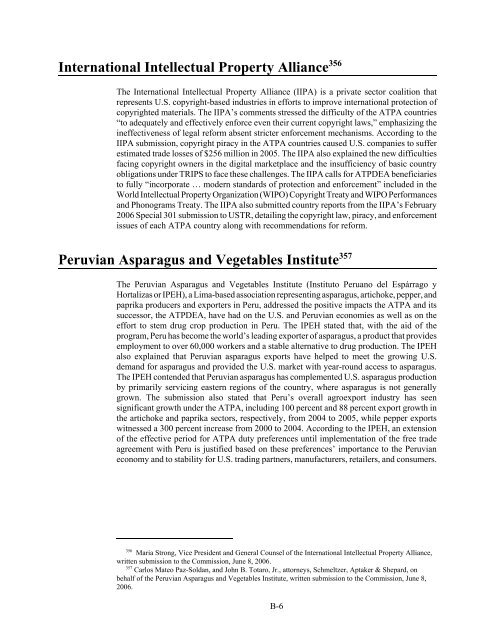The Impact of the Andean Trade Preference Act Twelfth ... - USITC
The Impact of the Andean Trade Preference Act Twelfth ... - USITC
The Impact of the Andean Trade Preference Act Twelfth ... - USITC
- No tags were found...
Create successful ePaper yourself
Turn your PDF publications into a flip-book with our unique Google optimized e-Paper software.
International Intellectual Property Alliance 356<strong>The</strong> International Intellectual Property Alliance (IIPA) is a private sector coalition thatrepresents U.S. copyright-based industries in efforts to improve international protection <strong>of</strong>copyrighted materials. <strong>The</strong> IIPA’s comments stressed <strong>the</strong> difficulty <strong>of</strong> <strong>the</strong> ATPA countries“to adequately and effectively enforce even <strong>the</strong>ir current copyright laws,” emphasizing <strong>the</strong>ineffectiveness <strong>of</strong> legal reform absent stricter enforcement mechanisms. According to <strong>the</strong>IIPA submission, copyright piracy in <strong>the</strong> ATPA countries caused U.S. companies to sufferestimated trade losses <strong>of</strong> $256 million in 2005. <strong>The</strong> IIPA also explained <strong>the</strong> new difficultiesfacing copyright owners in <strong>the</strong> digital marketplace and <strong>the</strong> insufficiency <strong>of</strong> basic countryobligations under TRIPS to face <strong>the</strong>se challenges. <strong>The</strong> IIPA calls for ATPDEA beneficiariesto fully “incorporate … modern standards <strong>of</strong> protection and enforcement” included in <strong>the</strong>World Intellectual Property Organization (WIPO) Copyright Treaty and WIPO Performancesand Phonograms Treaty. <strong>The</strong> IIPA also submitted country reports from <strong>the</strong> IIPA’s February2006 Special 301 submission to USTR, detailing <strong>the</strong> copyright law, piracy, and enforcementissues <strong>of</strong> each ATPA country along with recommendations for reform.Peruvian Asparagus and Vegetables Institute 357<strong>The</strong> Peruvian Asparagus and Vegetables Institute (Instituto Peruano del Espárrago yHortalizas or IPEH), a Lima-based association representing asparagus, artichoke, pepper, andpaprika producers and exporters in Peru, addressed <strong>the</strong> positive impacts <strong>the</strong> ATPA and itssuccessor, <strong>the</strong> ATPDEA, have had on <strong>the</strong> U.S. and Peruvian economies as well as on <strong>the</strong>effort to stem drug crop production in Peru. <strong>The</strong> IPEH stated that, with <strong>the</strong> aid <strong>of</strong> <strong>the</strong>program, Peru has become <strong>the</strong> world’s leading exporter <strong>of</strong> asparagus, a product that providesemployment to over 60,000 workers and a stable alternative to drug production. <strong>The</strong> IPEHalso explained that Peruvian asparagus exports have helped to meet <strong>the</strong> growing U.S.demand for asparagus and provided <strong>the</strong> U.S. market with year-round access to asparagus.<strong>The</strong> IPEH contended that Peruvian asparagus has complemented U.S. asparagus productionby primarily servicing eastern regions <strong>of</strong> <strong>the</strong> country, where asparagus is not generallygrown. <strong>The</strong> submission also stated that Peru’s overall agroexport industry has seensignificant growth under <strong>the</strong> ATPA, including 100 percent and 88 percent export growth in<strong>the</strong> artichoke and paprika sectors, respectively, from 2004 to 2005, while pepper exportswitnessed a 300 percent increase from 2000 to 2004. According to <strong>the</strong> IPEH, an extension<strong>of</strong> <strong>the</strong> effective period for ATPA duty preferences until implementation <strong>of</strong> <strong>the</strong> free tradeagreement with Peru is justified based on <strong>the</strong>se preferences’ importance to <strong>the</strong> Peruvianeconomy and to stability for U.S. trading partners, manufacturers, retailers, and consumers.356 Maria Strong, Vice President and General Counsel <strong>of</strong> <strong>the</strong> International Intellectual Property Alliance,written submission to <strong>the</strong> Commission, June 8, 2006.357Carlos Mateo Paz-Soldan, and John B. Totaro, Jr., attorneys, Schmeltzer, Aptaker & Shepard, onbehalf <strong>of</strong> <strong>the</strong> Peruvian Asparagus and Vegetables Institute, written submission to <strong>the</strong> Commission, June 8,2006.B-6
















